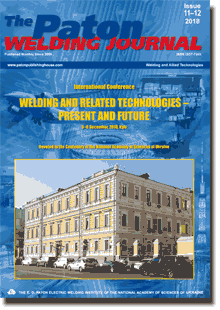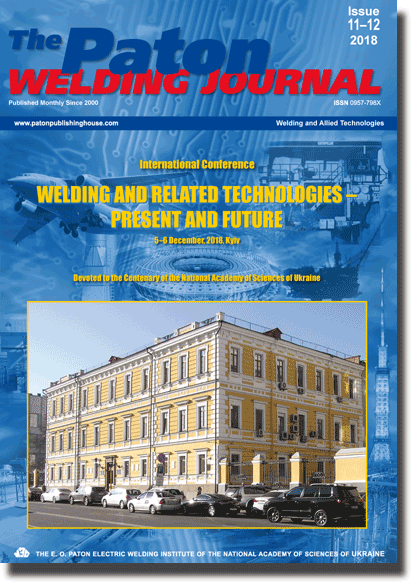| 2018 №12 (09) |
DOI of Article 10.15407/tpwj2018.12.10 |
2018 №12 (11) |

The Paton Welding Journal, 2018, #11-12, 91-104 pages
Journal The Paton Welding Journal
Publisher International Association «Welding»
ISSN 0957-798X (print)
Issue #11-12, 2018 (November)
Pages 91-104
Anode processes in welding arcs
I.V. Krivtsun
E.O. Paton Electric Welding Institute of the NAS of Ukraine 11 Kazimir Malevich Str., 03150, Kyiv, Ukraine. E-mail: office@paton.kiev.ua
The paper describes the approaches to theoretical investigation and mathematical models of physical processes running in the anode layer of high-current (~ 102 A) electric arcs, burning in inert gas at atmospheric pressure. Numerical studies of anode processes in electric arcs with nonevaporating (water-cooled) anode, as well as in welding arcs (arcs with evaporating anode) were performed. It is shown that anode potential drop in the considered arcs is negative, having an essentially nonuniform distribution in the region of anode attachment of the arc. The latter circumstance largely determines the pattern of electric current flowing and energy transfer between arc plasma and anode (arc contraction on the anode or discharge distributed over anode surface). A procedure of calculation of effective anode drop in electric arcs is proposed, allowing for the above change of anode potential drop along the anode surface. 32 Ref., 1 Table, 15 Figures.
Keywords: welding arc, arc plasma, arc column, anode layer, anode potential drop, heat flow into the anode, evaporation, mathematical modeling
Received: 11.09.18
Published: 23.11.18
References
1. Nemchinsky, V.A., Perets, L.N. (1977) Near-anode layer of high-current high-pressure arc. ZhTF, 47, 1868-1875 [in Russian].
2. Dinulescu H. A., Pfender E. (1980) Analysis of the anode boundary layer of high intensity arcs. J. of Appl. Phys., 51, 3149–315. https://doi.org/10.1063/1.328063
3. Dyuzhev, G.A., Nemchinsky, V.A., Shkolnik, S.M. et al. (1983) Anode processes in high-current arc discharge. Khimiya Plazmy, 10, 169-209 [in Russian].
4. Nazarenko I. P., Panevin I. G. (1989) Analysis of the near-anode processes character in argon arc discharge of high pressure. Contrib. Plasma Phys., 29, 251–261. https://doi.org/10.1002/ctpp.2150290303
5. Nemchinsky V. A. (1994) Size and shape of the liquid droplet at the molten tip of an arc electrode. J. Phys. D: Appl. Phys., 27, 1433–1442. https://doi.org/10.1088/0022-3727/27/7/014
6. Jenista J., Heberlein J. V. R., Pfender E. (1997) Numerical model of the anode region of high-current electric arcs. IEEE Trans. on Plasma Science, 25, 883–890. https://doi.org/10.1109/27.649585
7. Amakawa T., Jenista J., Heberlein J. et al. (1998) Anode-boundary-layer behavior in a transferred, high intensity arc. J. Phys. D: Appl. Phys., 31, 2826–2834. https://doi.org/10.1088/0022-3727/31/20/017
8. Tanaka M., Ushio M., Wu C. S. (1999) One-dimensional analysis of the anode boundary layer in free-burning argon arcs. Ibid, 32, 605–611. https://doi.org/10.1088/0022-3727/32/5/016
9. Murphy A. B. (2010) The effects of metal vapour in arc welding. Ibid, 43, 434001 (31 pp).
10. Zhu P., Lowke J. J., Morrow R. et al. (1995) Prediction of anode temperatures of free burning arcs. Ibid, 28, 1369–1376. https://doi.org/10.1088/0022-3727/28/7/014
11. Lowke J. J., Morrow R., Haidar J. (1997) A simplified unified theory of arcs and their electrodes. Ibid, 30, 2033–2042. https://doi.org/10.1088/0022-3727/30/14/011
12. Fan H. G., Kovacevic R. (2004) A unified model of transport phenomena in gas metal arc welding including electrode, arc plasma and molten pool. Ibid, 37, 2531–2544. https://doi.org/10.1088/0022-3727/37/18/009
13. Nishiyama H., Sawada T., Takana H. et al. (2006) Computational simulation of arc melting process with complex interactions. ISIJ International, 46, 705–711. https://doi.org/10.2355/isijinternational.46.705
14. Hu. J., Tsai H. L. (2007) Heat and mass transfer in gas metal arc welding. Part I: The arc. Int. J. of Heat and Mass Transfer, 50, 833–846. https://doi.org/10.1016/j.ijheatmasstransfer.2006.08.025
15. Masquere M., Freton P., Gonzalez J. J. (2007) Theoretical study in two dimensions of the energy transfer between an electric arc and an anode material. J. Phys. D: Appl. Phys., 40, 432–446. https://doi.org/10.1088/0022-3727/40/2/020
16. Benilov M. S. (2008) Understanding and modelling plasma-electrode interaction in high-pressure arc discharges: a review. Ibid, 41, 144001 (30 pp).
17. Lancaster J. F. (1986) The physics of welding, 2nd Edition. Pergamon Press.
18. Sanders N. A., Pfender E. (1984) Measurement of anode falls and anode heat transfer in atmospheric pressure high intensity arcs. J. of Appl. Phys., 55, 714–722. https://doi.org/10.1063/1.333129
19. Tanaka M., Ushio M. (1999) Observations of the anode boundary layer in free-burning arcs. J. Phys. D: Appl. Phys., 32, 906–912. https://doi.org/10.1088/0022-3727/32/8/011
20. Krivtsun I., Demchenko V., Lesnoi A. et al. (2010) Modelling of electromagnetic processes in system «welding arc evaporating anode»: Part 1 Model of anode region. Science and Technology of Welding and Joining, 10, 457–462. https://doi.org/10.1179/136217110X12665778348506
21. Krivtsun I., Demchenko V., Krikent I. et al. (2015) Distributed and integrated characteristics of the near-anode plasma of the welding arc in TIG and Hybrid (TIG + CO2 Laser) welding. Mathematical Modelling of Weld Phenomena 11 Techn. Universität Graz, Graz, Austria, pp. 837–874.
22. Semenov I. L., Krivtsun I. V., Reisgen U. (2016) Numerical study of the anode boundary layer in atmospheric pressure arc discharges. J. Phys. D: Appl. Phys., 49, 105204 (12 pp).
23. Almeida N. A., Benilov M. S., Naidis G. V. (2008) Unified modelling of near-cathode plasma layers in high-pressure arc discharges. Ibid, 41, 245201 (26 pp).
24. Zhdanov V. M. (2002) Transport processes in multicomponent plasma. London, Taylor&Francis.
25. Krivtsun I. V. (2001) Model of evaporation of metal in arc, laser and laser-arc welding. The Paton Welding Journal, 3, 2–9.
26. Baksht, F.G., Dyuzhev, G.A., Mitrofanov, N.K. et al. (1973) Probe measurements in low-temperature dense plasma at high degree of ionization. ZhTF, 43(12), 2574-2583 [in Russian].
27. Chen, F. (1967) Electrical probes. In: Plasma disgnostics. Ed. by R.Huddleston et al. Moscow, Mir, 94–164 [in Russian].
28. Griem H. R. (1962) High-density correction in plasma spectroscopy. Phys. Rev., 128, 997–1001. https://doi.org/10.1103/PhysRev.128.997
29. Krivtsun I. V., Demchenko V. F., Krikent I. V. (2010) Model of the processes of heat, mass and charge transfer in the anode region and column of the welding arc with refractory cathode. The Paton Welding Journal, 6, 2–9.
30. Krikent I. V., Krivtsun I. V., Demchenko V. F. (2014) Simulation of electric arc with refractory cathode and evaporating anode. Ibid, 9, 17–24. https://doi.org/10.15407/tpwj2014.09.02
31. Demchenko V. F., Krivtsun I. V., Krikent I. V., et al. (2017) Force interaction of arc current with self magnetic field. Ibid, 3, 15–24.
32. Semenov O., Demchenko V., Krivtsun I. et al. (2012) A dynamic model of droplet formation in GMA welding. Modelling and Simulation in Materials Science and Engineering, 20, 045003 (14 pp).
Suggested Citation
I.V. Krivtsun (2018) Anode processes in welding arcs. The Paton Welding J., 12, 91-104.The cost of subscription/purchase order journals or individual articles
| Journal/Currency | Annual Set | 1 issue printed |
1 issue |
one article |
| TPWJ/USD | 384 $ | 32 $ | 26 $ | 13 $ |
| TPWJ/EUR | 348 € | 29 € | 24 € | 12 € |
| TPWJ/UAH | 7200 UAH | 600 UAH | 600 UAH | 280 UAH |
| AS/UAH | 1800 UAH | 300 UAH | 300 UAH | 150 UAH |
| AS/USD | 192 $ | 32 $ | 26 $ | 13 $ |
| AS/EUR | 180 € | 30 € | 25 € | 12 € |
| SEM/UAH | 1200 UAH | 300 UAH | 300 UAH | 150 UAH |
| SEM/USD | 128 $ | 32 $ | 26 $ | 13 $ |
| SEM/EUR | 120 € | 30 € | 25 € | 12 € |
| TDNK/UAH | 1200 UAH | 300 UAH | 300 UAH | 150 UAH |
| TDNK/USD | 128 $ | 32 $ | 26 $ | 13 $ |
| TDNK/EUR | 120 € | 30 € | 25 € | 15 € |
AS = «Automatic Welding» - 6 issues per year;
TPWJ = «PATON WELDING JOURNAL» - 12 issues per year;
SEM = «Electrometallurgy Today» - 4 issues per year;
TDNK = «Technical Diagnostics and Non-Destructive Testing» - 4 issues per year.


